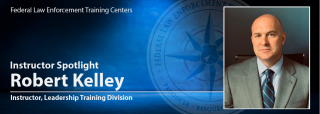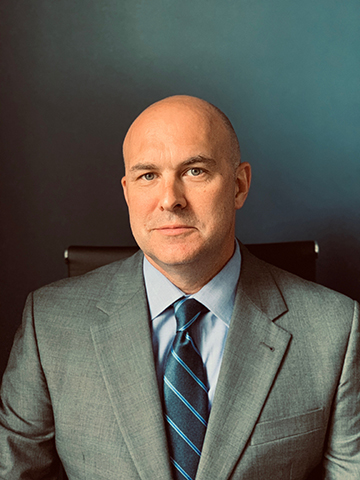
“I grew up hearing stories of King Arthur and knights, and I always wanted to be one of those guys – the good guy.”
One might ask, what being “the good guy” truly looks like, ultimately for Instructor Robert Kelley – being the good guy meant understanding that “the only thing you can truly control in life is yourself.”

Kelley learned this concept early on in life, and since has kept it near and dear.
With an interest in saving money for college, Kelley joined the United States Army as a non-commissioned Infantry Officer, where he was responsible for leading Infantry Soldiers at all levels of command and combined armed forces during missions on the ground.
“My third day in basic training, I was made the platoon officer,” said Kelley. “I asked my drill sergeant why he picked me, and he said it was because he didn’t know my name.”
Kelley kicked off his first career in law enforcement with the U.S. Marshals Service (USMS) in Brooklyn, New York. “It was difficult living in New York because I was a country boy, so being in a big city was a challenge,” said Kelley. “What helped was the comradery, I worked with a great bunch of guys, and we shuffled prisoners around from courts and jail, day in and day out.”
After three years with USMS, Kelley interviewed with the U.S. Bureau of Alcohol, Tobacco, Firearms & Explosives (ATF) and the Drug Enforcement Administration (DEA) on the same day.
“I went with ATF,” stated Kelley. “I got sent to Rochester, NY, which was a satellite post, and our office was in the basement of the courthouse in the old janitor’s supply room. I remember having to walk through the daycare hallway, and half the lights in the supply room were out. I thought it was a joke.”
“It was so tight, if one of us had to stand up, one of us had to cram into the corner,” laughed Kelley. “And, we only had one phone line. So, if one of us had to make a call, we had to unplug the line and plug it into the other phone.”
Kelley was an ATF field agent for three years before he became a Special Response Team member on the ATF Response Team. “We operated in firearms, violence, and street gangs,” explained Kelley. “I had to receive a waiver to get on the ATF special response team with under three years at the job. It was worth it. It was fun. I got to travel all over the U.S. issuing high-risk warrants.”
“Most time I was the entry team leader, so I was responsible for anything that happened inside the operation while serving warrants,” explained Kelley. “We had quarterly training and the best bunch of guys; the best part was the comradery and knowing you were making a serious impact.”
At the time, Kelley was a part-time operator until he accepted the position as a full-time operator working out of Washington, D.C.
“This was the best job. It was all the excitement, hardly any paperwork,” said Kelley. “I did a lot of the advances before the operations. I would gather intel, meet with case agents to discuss logistics, then I would write up the operations plan and I would oversee briefing the team before the actual operation.”
In 2001, Kelley was asked to put in for a supervisor position, during a time when his wife experienced serious health issues. “At the time, I didn’t want to take a supervisor position because I liked being on the team, but my wife was having some serious health problems, and I thought it was the right time to take a step back.”
As a first-line supervisory special agent, he led and managed special agents in tactical operatives and violent crime reduction, crime gun intelligence, interstate and international firearms trafficking, criminal and terrorist explosive incidents/bombings, arson and major commercial fire investigations, gangs, undercover enforcement operations and other violations involving the criminal use/possession of firearms and explosives.
In 2004, Kelley’s wife went into pre-term labor with their twins. Due to preexisting health problems, Kelley’s wife endured life-threatening hospital stays. “I had to go back and forth to the hospital to see my wife and take care of the kids by myself,” expressed Kelley. “I remember carrying the twins in two carriers, thinking I was going to end up having big arms.”
“And that is when I understood family – the importance of the job, and work/life balance,” said Kelley. “I just kept showing up for my wife and my kids, and we made out okay. It all worked out.”
A few years later, the boss of Philadelphia called Kelley and asked if he wanted to take the position as the Resident Agent in Charge of the Harrisburg ATF Field Office.
“At the time, my wife was feeling better,” said Kelley. “So, I told them no I don’t want the position. The next day, I received a call from the “big boss”, and he told me that I do want to take the job. Next thing I know, I was the Resident Agent in Charge of the Harrisburg ATF Field Office overseeing 33 counties.”
After five years in that position, Kelley’s boss requested he take a position at Headquarters (HQ) in D.C. Although, he respectfully declined, Kelly found himself in D.C. where he received a promotion to Deputy Chief of Field Management Staff Division. After two years at HQ, the Assistant Special Agent in Charge (ASAC) from the Philadelphia Field Division informed Kelley that he was asked to be the Chief of the ATF National Academy at the Federal Law Enforcement Training Centers (FLETC) in Glynco, Georgia.
“The ASAC told me he would do it if he could pick his Deputy Chief. That move brought my family and I down here to FLETC.”
“The family really liked the warm weather,” recalls Kelley. “I moved down here in July 2016 and my oldest daughter started her senior year four days later. Her grades were so good that she could have gone to school for free in Georgia, but she decided to go to Penn State instead which was very much not free.”
After two years as the Deputy Chief of the ATF Academy, Kelley retired from ATF in July of 2018 with 25 years in federal service. Subsequently, he was hired as a rehired annuitant with the FLETC Leadership Institute.
“I never really wanted any of it,” expressed Kelley. “Every leadership position I have had, I have been asked or pushed into it; so, I make sure to take care of my people and take care of them always because the mission gets accomplished when you take care of your people.”
Kelley has held numerous leadership positions in tactical, operational, strategic, and educational environments. Presently, he teaches leadership programs at FLETC, domestically and internationally. When asked what his favorite leadership course is, Kelley says “Leadership for Women in Law Enforcement (LWLE) is my favorite. It was one of our most asked for programs.”

“I think I have the biggest impact with those participants; more than I do with any other program,” said Kelley. “There is always a female instructor that I am paired with, and we do a deeper dive into some of the personal issues that some of the women participants endure as opposed to some of the other training programs.”
“We will actually sit down one-on-one and discuss the reports in-depth, where they can talk about the things that disturb them personally and emotionally. I feel most of the participants walk away feeling more optimistic about moving forward.”
“There is a concept that we teach in the LWLE program. It is “The Three Spheres of Influence” -You draw three circles and in the outer circle you write your worries, in the second circle you write what you can influence and/or take actions, then in the inner circle is your sphere of control. And you will learn that you can only control you.”
“I enjoy what I do, and I loved my LE career,” expressed Kelley. “I got into teaching, and I found that it’s really enjoyable. I like talking to the students and learning more from them. Most of the time, I expect to learn more from them than they learn from me – and I find that rewarding.”
When it comes to work, Kelley prides himself on having a good work-life balance. “I’ve experienced more stress dealing with the issues that arise in my family life than my LE career. Stress can kill you. Plus, I have always thought of doing what needs to be done. It’s honestly about playing the hand you are dealt, and not worrying about the things you can’t control because the only thing you can truly control in life is yourself.”
Kelley enjoys spending time with his wife, Kellie, and their four kids – Erin, Keira, Cassidy, and Killian. Erin, his oldest daughter, graduated from Penn State University and now works for a pharmaceutical company. The twins Keira and Cassidy graduated from high school, one is in college and the other is working. Killian, on the other hand, is deciding what professional football team he will play for so he can buy his dad a cabin in the mountains for Kelley to get away and fish for the rest of his life. “My wife has endured a lot of medical treatments over the past 20 years,” expressed Kelley. “She is finally at a place in her life where her health problems are at a good point, and she can travel more. She wants to travel more!”

